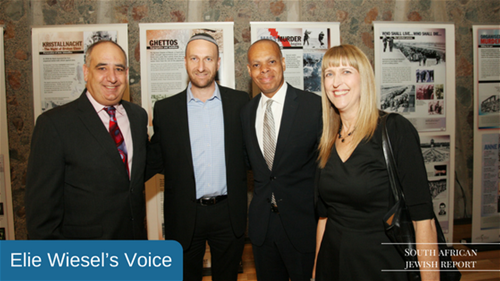
Banner

Elie Wiesel and the significance of memory
ADAM LEVIN

H.E. Ambassador Arthur Lenk; Shaun Zagnoev; H.E. Ambassador Patrick Gaspard; and Tali Nates.
Photographer: Ilan Ossendryver
This sentiment echoed throughout the proceedings of the Johannesburg Holocaust & Genocide Centre in partnership with the SAJBD’s memorial to Wiesel that took place last Sunday night. The date for the memorial – September 11 – was particularly significant because it also marked 15 years since the 9/11 attacks on the Twin Towers.
This provided the Centre with an opportunity to not only honour Wiesel himself, but also his central message about the significance of memory and his wish for a peaceful and just world.
After introductions by the Centre’s director Tali Nates and SAJBD Gauteng Council Chairman Shaun Zagnoev, the memorial tributes started with an address from US Ambassador to South Africa, Patrick H Gaspard, who said: “I honour tonight not only Elie Wiesel, but also Mrs Feingold – a Holocaust survivor who took my immigrant family in when we arrived as penniless refugees in New York.”
Gaspard fondly recalled his own encounters with Wiesel during his lifetime, as well as his love for America, one of his three adopted homelands (the others being Israel and France).
Addressing the importance of the memory of 9/11 to the evening, Gaspard said: “We are convened here on 9/11 to remember Wiesel. Wiesel said we had a sacred duty to remember. Elie Wiesel was a masterful architect of remembrance.”
Gaspard observed that while Wiesel never stopped speaking against anti-Semitism, he was also a voice, wherever needed, against other atrocities, including the genocide in Rwanda and apartheid in South Africa.
Israel’s Ambassador to South Africa Arthur Lenk, spoke of Wiesel’s love for and dedication to the State of Israel. He noted that while many victims of the Holocaust lost their faith as a result of their suffering, Wiesel “redoubled his connection to Judaism and the State of Israel”.
The evening concluded with powerful words from Holocaust survivor Don Krausz who observed that Wiesel’s key message was “to not dehumanise people”. He enforced the theme of remembrance by referencing Wiesel’s acceptance speech after winning the Nobel Peace Prize, during which he stated, in reference to the victims of the Holocaust: “We must keep their memory alive. If we forget, we are accomplices.”
Krausz read a devastating passage from Wiesel’s famed memoir “Night”, paying the final honour to a man who will forever be the messenger to all humanity.
Tali Nates, the programme director of the event recollected the immense honour she had in meeting Wiesel and hearing his words: “When you listen to a witness, you become a witness.”
Now it is up to places of memory and education such as the Johannesburg Holocaust & Genocide Centre to carry on the void left by Wiesel’s passing.
Nates quoted from Professor Michael Berenbaum’s obituary to Wiesel saying: “…the world he leaves behind is in ever more desperate need of his voice.”




